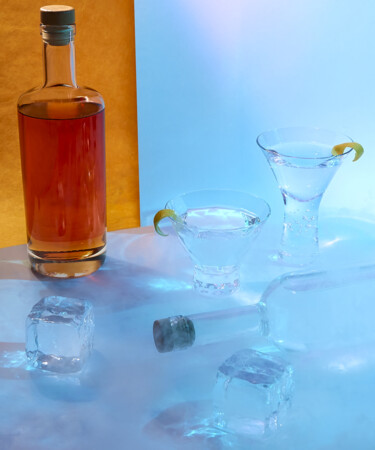If you have a well-stocked bar at home, you might keep a bottle of vodka in the freezer on standby — and maybe a big-batched Martini along with it. Freezing vodka is one of the most common practices to ensure a luscious, ice-cold pour perfect for stirring or shooting straight. But why do people put vodka in the freezer and leave other spirits on their bar carts?
Why doesn’t vodka freeze?
It’s perfectly safe to freeze vodka, and chilling a bottle in the freezer can offer some solid benefits. As the spirit contains 40 percent ABV, it must hit at least minus-10 degrees Fahrenheit before it actually solidifies. Since conventional kitchen freezers can’t reach below 0, the vodka stored inside them won’t freeze. Instead, as the temperature drops, the liquid will develop a softer, more viscous mouthfeel that makes it drink smoother no matter how you serve it.
Why do people put vodka in the freezer?
While that richer texture makes a great case for freezing vodka, the practice does come at a tradeoff: The colder the spirit gets, the more muted its flavors and aromas become. But as most vodkas are distilled to the point of being near-odorless and neutral on the palate, the spirit won’t lose much character in the icebox, making it the ideal candidate for freezing. In fact, it will probably make Vodka Martinis and shots of the stuff much smoother going down. But the same can’t be said for all spirits — especially whiskey.
Why don’t you freeze whiskey?
At higher, non-frozen temperatures, spirits release something known as volatiles, which are compounds that easily vaporize. Some of these volatiles (like pure alcohol) can be overwhelming, which is why the pros recommend drinking whiskey over ice or with a few drops of water. But some volatiles — like those that develop due to time spent aging in barrels — add desirable character to a dram of whiskey or Scotch, and freezing those spirits can dull all the aroma and flavor they offer.
“There are comparatively fewer volatiles in vodka, while the whole point of aging whiskey is to create desirable volatiles,” says Kevin Liu, chief cocktail maker at Richmond’s The Tin Pan. “[The whiskey] doesn’t lose any volatiles, [they’re] just harder to detect when you have cold whiskey. Putting [whiskey] in the freezer and then taking it out will have no effect at all.”
That’s why storing your whiskey on your bar cart is your best bet. The same goes for more high-end or nuanced vodkas like Arbikie Nàdar Vodka or Chopin Vodka Family Reserve, which we suggest stirring with ice and straining to serve. But when it comes to most vodkas on the market, they’ll find a happy home in your freezer.
